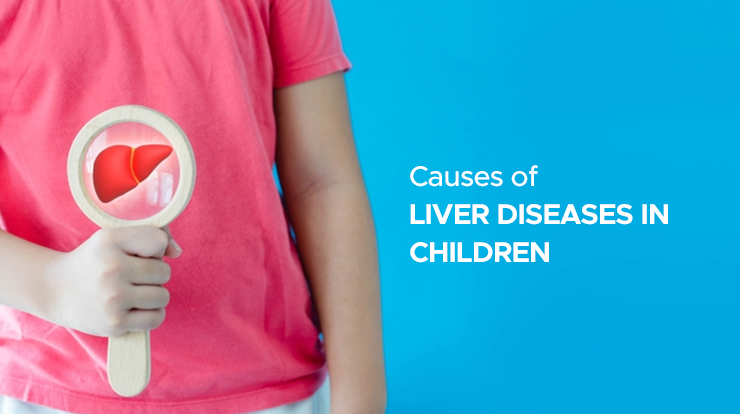What can cause liver disease in kids?
![]()

It is known as liver disease or liver failure when the liver becomes diseased, does not work properly, and becomes damaged (either completely or partially). Even though it is quite rare, it is found in many children. Some kids face extreme issues, while some recover soon without more issues.
However, some kids must undergo liver transplant surgery for survival. There are two main types of liver failure in children:
- Acute liver failure- This type of liver failure comes suddenly, sometimes without any symptoms. It occurs in children with no known prior liver disease.
- Chronic liver failure- This type occurs when a long-lasting liver disease becomes much worse, either slowly or suddenly.
Major cause of liver diseases in children
Children of any age group can suffer from liver disease or failure. Liver failure might be a result of several types of disease or injury. However, the cause is not often found. Mentioned below are some of the major causes of sudden failure or acute liver disease.
- Some disorders are inherited metabolic disorders, for example, tyrosinemia, hereditary fructose intolerance (HFI), galactosemia, mitochondrial diseases, Wilson disease (more copper in parts of the body), and so on.
- Viruses, for example, Epstein-Barr virus (EBV), herpes (HSV), cytomegalovirus (CMV) or hepatitis A, B and E, etc. However, several other viruses are responsible for causing acute liver failure. At present, only a few viruses have been found, and many more are still not discovered or described yet.
- Immune system issues, such as autoimmune hepatitis.
- Some toxins include rat poison, weed killer, a few particular mushrooms (wild), insect killer, some solvents or cleaners, and so on.
- Low blood flow to the liver, such as heart failure, shock or a blocked blood vessel.
Chronic liver disease is one which causes long-term issues but is formed slowly in the body. It usually happens once a child has developed cirrhosis (severe liver scarring) issues. Mentioned below are some of the major causes of why children suffer from chronic liver disease or failure.
- Inherited conditions include alpha-1 antitrypsin deficiency, cystic fibrosis (inherited diseases that also affect the lungs), hemochromatosis (too much iron in the body), etc.
- Diseases associated with bile ducts include sclerosing cholangitis (chronic inflammation of the bile ducts), biliary atresia (blocked or incompletely formed bile ducts in babies), and so on.
- Chronic hepatitis, such as hepatitis C, nonalcoholic steatohepatitis (a severe form of fatty liver disease), autoimmune hepatitis, etc.
- Heart-related issues result in reduced blood supply to the liver or lead to a backup of blood flow in the liver.
Symptoms of liver disease in children
In the initial stage, liver disease symptoms seem like a common childhood illness (for example, any type of flu). However, when the disease is in its early stage, it might involve the following signs and symptoms.
- Loss of appetite
- Belly or abdominal pain
- Fatigue (tired feeling all the time, even after taking proper rest and sleep)
- Vomiting or nausea
However, if the issues associated with the liver get worse, it might show some other signs and symptoms. Some of the liver disease symptoms are as follows:
- Itching all over the body
- Swollen abdomen from fluid building up (ascites)
- Dark urine
- Bruising easily or bleeding for a long time
- Jaundice (yellowish skin and eyes)
- Issues related to the brain such as unusual sleepiness during the day or sleeplessness at night (encephalopathy), confusion and irritation all the time
Also Read: Some common liver diseases
How is diagonalization done for liver diseases in children?
It is quite difficult to determine or diagnose liver-related issues in the early stages. The symptoms are similar to the other issues, so the doctors perform many specific tests and find the actual illness. If the symptoms are clearer, patients are suggested to get the following tests mentioned below.
- High liver enzyme levels
- Signs of encephalopathy (also known as brain damage)
- High bilirubin levels lead to jaundice
- Issues with clotting of blood
The bottom line
Liver diseases in children are manageable if caught at the initial stages. However, if not treated on time, they can permanently damage the liver and affect its functioning. In addition, untreated or unmanaged liver disease complications can lead to cirrhosis and severe scarring that cannot be reversed. If cirrhosis goes too far, the child must undergo a Liver Transplant in India.
Some liver diseases can develop without any signs or symptoms. Thus, parents need to take their children for annual checkups. In addition, they must focus on a nutritious diet, physical exercise, and other healthy lifestyle choices, such as limiting junk foods, being more engaged in sports, and more.



